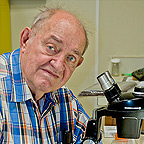 Leading non-marine malacologist Fred G. Thompson died Tuesday, Dec. 27, 2016, at the age of 82. Born in 1934 in Cleveland, Ohio, Fred was fascinated by the natural world from an early age. Herpetology was his initial interest, but during his travels he was struck by the diversity of non-marine mollusks and became intrigued by the lack of published research on the group. This realization propelled him on a 65 year-long odyssey to nearly every corner of the planet to discover, study, and publish on these diverse, poorly known and often endangered animals.
Leading non-marine malacologist Fred G. Thompson died Tuesday, Dec. 27, 2016, at the age of 82. Born in 1934 in Cleveland, Ohio, Fred was fascinated by the natural world from an early age. Herpetology was his initial interest, but during his travels he was struck by the diversity of non-marine mollusks and became intrigued by the lack of published research on the group. This realization propelled him on a 65 year-long odyssey to nearly every corner of the planet to discover, study, and publish on these diverse, poorly known and often endangered animals.
Fred’s first papers on the systematics of land snails in Mexico and Central America were published while he was an undergraduate at the University of Michigan, from where he graduated in 1958. He received his Master of Science at Wayne State University in 1961. After graduating, Fred moved to Florida where he received his PhD at the University of Miami in 1964. His dissertation led to his seminal work on the hydrobiid snails of Florida’s springs (Thompson 1968). These taxonomically difficult, minute, and diverse snails are often restricted to single spring runs and include numerous species that are highly endangered by hydrological changes and other habitat modifications resulting from Florida’s rapid Anthropocene development. The existence of many of these species would not be known if not for Fred’s extensive surveys throughout the state.
In 1965 Fred moved to The University of Florida to work as a Research Associate and in September 1966 he was hired as Florida Museum of Natural History’s first molluscan curator. Through his tireless fieldwork and careful acquisition of private and orphaned collections, he took a small collection of a few hundred local mollusks and grew it into the largest Mollusk collection in the southeast and one of the largest in the country with over a half million specimen lots of approximately 3 million specimens. The collection has the largest non-marine snail collection in the world from Hispaniola, Mexico-Central America, Madagascar, Pakistan, and Thailand, and also has especially large holdings from the southeastern United States, West Indies, Andean South America, SE Asia, and Oceania. Fred was also an early proponent of collection digitization. Because of his foresight, the entire collection is accessible online, serving data on more mollusks than any other collection in the world.
Throughout his career, he continued to work on non-marine snails of Mexico and Central America, leading to the discovery of many species and resulting in the only modern compilation of the non-marine molluscan fauna of the area (Thompson, 2011). His work on freshwater snails in the southeastern United States and especially Florida led to the publication of the only key to Florida’s freshwater snails (Thompson 1999) and helps form the basis for most other research on these highly endangered animals.
Fred was honored with an Appreciation Award for his “Dedication and Support in Preserving the Wekiva River Basin” by the Friends of the Wekiva River in 2001 and he received a Lifetime Achievement award from The Florida Association of Benthologists in May 2011.
Fred retired, becoming Curator Emeritus, in October of 2012 and continued to work on his beloved mollusks until his death. His contributions continue to be felt through his students, many of whom work at museums, universities and government agencies in the United States, Mexico, and Central America.
— John Slapcinsky, Invertebrates collection manager
Thompson, F.G. 1968. The aquatic snails of the family Hydrobiidae of peninsular Florida. University of Florida Press, Gainesville 268 p.
Thompson, F.G. 1999. An identification Manual for the freshwater snails of Florida. Walkerana 10(23): 1-96.
Thompson, F.G. 2011. An annotated checklist and bibliography of the land and freshwater snails of Mexico and Central America. Bulletin of the Florida Museum of Natural History 50(1): 1–299.